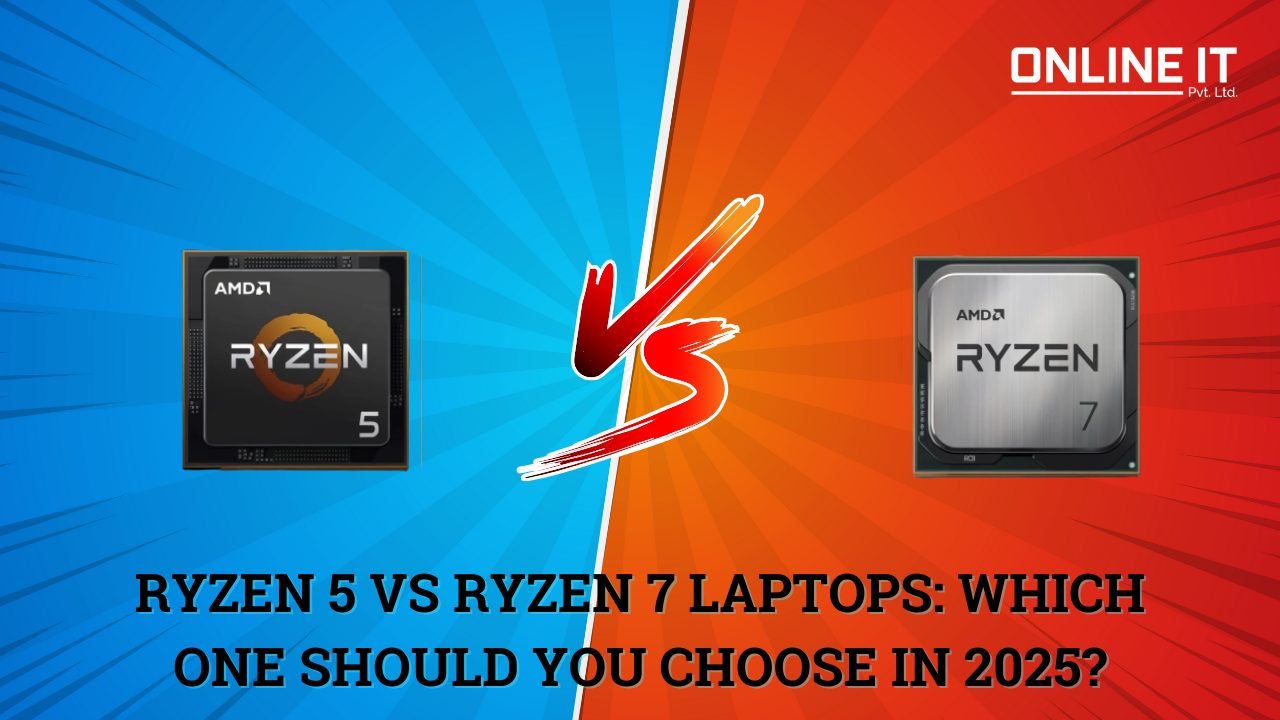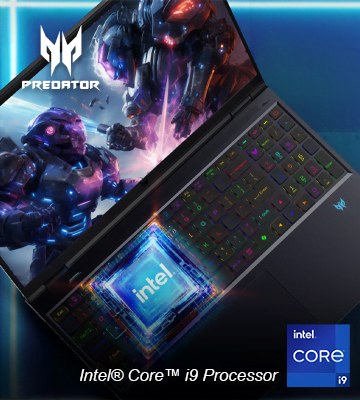Ryzen 5 vs Ryzen 7 Laptops: Which Is Best for You in 2025?

AMD’s Ryzen 5 and Ryzen 7 chips have both matured into reliable powerhouses, serving different audiences. Whether you’re a student, creative, or multitasker, the choice between these two processors depends on what you expect from your laptop. This article explores real-world performance, multitasking capabilities, and value to help you determine which Ryzen processor best aligns with your daily needs.
Who Should Choose an AMD Ryzen 5 Laptop in 2025?
Ryzen 5 laptops powered by the 7000 series (e.g., Ryzen 5 7640hs) are renowned for their excellent multicore performance and impressive integrated graphics (RDNA 3). They often outperform Intel i5s in threaded workloads and offer excellent battery efficiency.
Great Choice For:
- Freelancers & Light Creators: Perfect for light video editing, podcasting, or running Canva and CapCut without lag.
- Students & Professionals: Handles schoolwork, research, web-based tools, and office productivity effortlessly.
- Gamers: Surprisingly good with integrated Radeon 760M graphics — can play Valorant, DOTA 2, and GTA V without needing a GPU.
- Multitaskers: Handles multiple Chrome tabs, Slack, and light editing software simultaneously.
Who Should Choose an AMD Ryzen 7 Laptop in 2025?
Ryzen 7 laptop processors, such as the 7840hs or 7735hs, are designed for creators, developers, and gamers who demand more. With 8 cores and 16 threads and support for high-efficiency RDNA 3 integrated graphics, Ryzen 7 laptops deliver workstation-grade speed in a compact form.
Ideal For:
- Content Creators: Handles 4K video editing, Photoshop batch processing, or DaVinci Resolve rendering like a champ.
- Gamers & Streamers: Plays modern AAA titles (e.g., Cyberpunk 2077, Elden Ring) when paired with a mid-range GPU and streams simultaneously via OBS or Streamlabs.
- Data Scientists and engineers: This is great for running models in Python, Jupyter Notebooks, or simulations in MATLAB or SolidWorks.
- Heavy Multitaskers: Easily switches between VMS, databases, browser windows, and creative apps.
- Remote Developers: This is ideal for full-stack or mobile app developers who need a snappy, thread-rich system for compiling and testing code locally.
Performance Comparison Table
| Feature | AMD Ryzen 5 | AMD Ryzen 7 |
| Cores/Threads | 6-8 Cores / 12-16 Threads | 8-12 Cores / 16-24 Threads |
| Clock Speed | 3.2 – 4.8 GHz | 3.4 – 5.0 GHz |
| Cache Memory | 16MB – 24MB | 20MB – 32MB |
| Power Efficiency | More efficient | Higher power consumption |
| Gaming Performance | Good for mid-range gaming | Excellent for high-end gaming |
| Video Editing | Basic to moderate editing | Faster 4K editing |
| Battery Life | Lasts longer on average | Consumes more battery |
| Heat Generation | Less heat | More heat due to higher power |
Pros and Cons of Ryzen 5 Laptops
Pros of Ryzen 5 Laptops:
- Lower Power Consumption: Ryzen 5 chips offer solid energy efficiency, extending battery life for students, remote workers, and frequent travellers.
- Handles Everyday Tasks Efficiently: It is perfect for web browsing, document editing, and light multitasking without lag.
- Strong Performance in Mid-Range Games: Paired with decent integrated graphics or a low-to-mid-tier GPU, it can handle casual gaming and media consumption effectively.
Cons of Ryzen 5 Laptops:
- Limited Performance in Demanding Applications: While suitable for everyday tasks, the Ryzen 5 may struggle with heavy workloads, such as professional video editing or software development.
- Not Ideal for 4K Video Editing or High-End Gaming: Ryzen 5 processors, especially those without a discrete graphics processing unit (GPU), are not ideal for professional video production or high-performance gaming.
- Less Performance in Single-Core Tasks: While excelling in multi-core workloads, the Ryzen 5 does not match the Intel i5 in single-core-heavy tasks, such as gaming or certain types of software development.
Pros and Cons of Ryzen 7 Laptops
Pros of Ryzen 7 Laptops:
- Faster Performance and Multitasking: Ideal for power users who require running demanding applications or multiple processes simultaneously.
- Ideal for Professional Workloads: Handles video editing, software development, 3D rendering, and simulations effortlessly — perfect for creators and professionals.
- Better Integrated GPU Performance: With AMD’s RDNA 3 integrated graphics, the Ryzen 7 offers superior graphics performance for gaming and creative tasks, eliminating the need for a dedicated graphics processing unit (GPU).
- Future-Proof for High-End Tasks: Ryzen 7’s high multi-core performance and thread count make it an excellent choice for demanding applications and future-proofing your laptop.
Cons of Ryzen 7 Laptops:
- Higher Price Point: Like the Intel i7, Ryzen 7 laptops are generally more expensive, making them a less budget-friendly option.
- Consumes More Power and Generates More Heat: The increase in performance comes at the cost of battery life and heat generation, potentially leading to thermal throttling in slim laptop designs.
- May Not Be Necessary for Casual Users: If you’re not doing intensive gaming, video editing, or professional-grade software development, the Ryzen 7 might be overkill for your needs.
Real-World Performance Benchmarks: Ryzen 5 vs Ryzen 7
Gaming Performance:
- Ryzen 5: A Ryzen 5 laptop can comfortably achieve 60-90 FPS in most modern games at medium settings. It delivers smooth gameplay for casual and mid-range gamers, handling popular titles like Fortnite, Apex Legends, and Rocket League without significant issues.
- Ryzen 7: The Ryzen 7 processor pushes performance further, achieving 100+ FPS at high settings with excellent stability. It’s ideal for gamers who want an enhanced gaming experience with more detailed graphics, smoother performance, and support for more demanding AAA games at higher settings.
Video Editing Performance:
- Ryzen 5: Rendering a 10-minute 4K video on a Ryzen 5 laptop may take around 15 minutes. While it’s capable of handling most video editing tasks, it’s slower than Ryzen 7 when dealing with large projects or high-resolution video.
- Ryzen 7: A Ryzen 7 laptop can significantly reduce render times, completing the same 10-minute 4K video in about 8-10 minutes. The additional cores and threads make it much more efficient for tasks like video editing, 3D rendering, and other creative workflows.
Battery Life:
- Ryzen 5: Laptops equipped with Ryzen 5 processors typically offer 6-10 hours of battery life, depending on usage patterns and individual usage habits. This makes it a good choice for students, remote workers, and casual users who need decent power without sacrificing battery life.
- Ryzen 7: Due to their increased performance, Ryzen 7 processors tend to consume more power, resulting in a battery life of 4-7 hours. While the Ryzen 7 offers more raw power, users will notice a reduction in battery life, particularly during demanding tasks such as gaming or video editing.
Example Ryzen 5 and Ryzen 7 Laptops
If you’re considering a Ryzen 5 laptop, check out models like:
For Ryzen 7 laptops, consider:
Conclusion
For users who require a reliable and cost-effective laptop for general productivity, web browsing, and media consumption, the Ryzen 5 laptop offers excellent value. It strikes a balance between performance and affordability, making it an ideal choice for casual users. On the other hand, Ryzen 7 laptops are tailored for professionals or power users who need enhanced performance for resource-intensive tasks like 3D rendering, advanced gaming, or multitasking. If your budget allows for it and you require top-tier performance, Ryzen 7 is the way to go.
Is Ryzen 7 better than Ryzen 5 laptop?
Yes, Ryzen 7 laptops are better than Ryzen 5 laptops in terms of performance. Ryzen 7 processors offer more cores and threads, which improves multitasking and speed for demanding tasks like video editing, 3D modeling, and high-end gaming. If you mostly do light tasks like web browsing, MS Office, or streaming, a Ryzen 5 is more than enough. But for professionals or gamers, Ryzen 7 is the better choice.
Is it worth upgrading Ryzen 5 to 7?
Yes, upgrading from Ryzen 5 to Ryzen 7 is worth it if you work with heavy applications or want long-term performance. Ryzen 7 CPUs have more cores, higher boost speeds, and better handling of tasks like 4K editing, gaming with high graphics settings, or multitasking with large apps. If your usage is limited to simple tasks, the upgrade may not be necessary.
Is Ryzen 5 good for a laptop?
Yes, Ryzen 5 is a solid option for most laptop users. They can handle multitasking, web browsing, video streaming, document editing, and even light photo or video editing. If you're looking for a reliable mid-range processor without spending too much, Ryzen 5 is a good choice.



